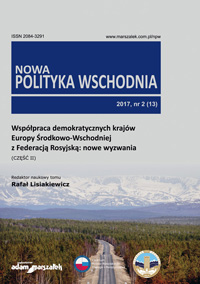Великий Шелковый путь и тенгрианство в стратегиях культурной политики современного Казахстана
The Great Silk Road and Tengriism in cultural policy strategies in modern Kazakhstan
Author(s): Aktolkyn Kulsariyeva, Zhanerke Shaygozova, Madina SultanovaSubject(s): Politics, Energy and Environmental Studies
Published by: Wydawnictwo Adam Marszałek
Keywords: Tengriism; the Great Silk Road; Kazakhstan; tolerance; cultural policy; identity
Summary/Abstract: In the paper, the chosen aspects of Kazakhstan’s contemporary cultural policy were examined, i.e., the new shape of the Silk Road, and the concept of Tengriism. Tengriism, being and open ideological and world-view shaping system, had an enormous influence on forming, developing and functioning of the unique and fundamental principles of peace and concord, which were recognized by the people of Kazakhstan as their political, economic, and cultural guidance. The nature of Tengriism, perceived in Central Asia, and in Kazakhstan in particular, not as a religion, but as an idiosyncratic worldview, was solidified due to tolerance principles, on which the Great Silk Road, among others factors, had a great influence throughout the years. Nowadays, the current contexts of Tengriism and the Silk Road have become essential components for the process of ethnic and cultural memory regeneration in modern Kazakhstan, thus fostering the national identity consolidation. The presented research focuses on three basic aspects: the specificity of cultural and historic landscape of the Great Steppe, conditioned by the historic presence and influence of the Silk Road; the various traces of Tengriism in modern Kazakhstan; and the potential of both Tengriism and the Silk Road evidenced in the present-day cultural policy of Kazakhstan.
Journal: Nowa Polityka Wschodnia
- Issue Year: 15/2017
- Issue No: 4
- Page Range: 96-111
- Page Count: 16
- Language: Russian

